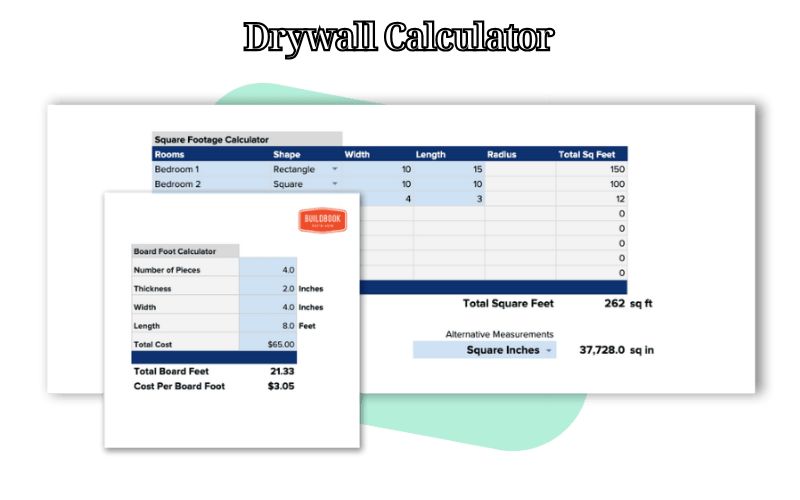Whether you’re remodeling a room, finishing a basement, or building a new home, estimating the materials needed for drywall installation can save time, money, and frustration. Vporm.xyz dives into the essentials of using a Drywall Calculator effectively and offers tips to ensure your estimates are accurate.
What is a Drywall Calculator?
A drywall calculator is an online tool or mobile app that helps you quickly calculate the materials needed to install drywall in a space. By inputting key dimensions such as wall height, room length, and ceiling dimensions, the calculator provides an estimate of:
- Number of drywall sheets required.
- Joint compound for taping and finishing seams.
- Drywall screws for proper installation.
- Drywall tape to reinforce joints.
This tool saves you from manual calculations, reducing the risk of ordering too much or too little material.
How to Use a Drywall Calculator
Using a drywall calculator is simple and involves a few straightforward steps:
- Measure Your Space
- Measure the height and width of each wall.
- Include measurements for ceilings if you’re covering them.
- Note the dimensions of windows and doors to exclude these areas from your calculations.
- Input Dimensions
Enter the measurements into the drywall calculator. Most calculators allow you to specify if you’re working on walls, ceilings, or both. - Choose Drywall Sheet Size
Drywall sheets come in standard sizes such as 4’x8’, 4’x10’, and 4’x12’. Select the size you plan to use for your project. - Review Results
The calculator will display the total number of drywall sheets needed, along with estimates for screws, tape, and joint compound.
Benefits of Using a Drywall Calculator
1. Saves Time
Manual calculations for a large project can be time-consuming and prone to errors. A drywall calculator speeds up the process and ensures accuracy.
2. Minimizes Waste
Ordering too much drywall leads to wasted money and storage issues, while ordering too little can delay your project. A drywall calculator helps you strike the right balance.
3. Simplifies Budgeting
Knowing the exact quantities of materials needed makes it easier to estimate costs, compare supplier prices, and stick to your budget.
4. Reduces Stress
Accurate estimates mean fewer surprises during installation, giving you confidence that you have everything you need.
Factors to Consider for Accurate Drywall Estimates
While a drywall calculator is a powerful tool, the following factors can impact the accuracy of your estimates:
1. Sheet Orientation
Decide whether you’ll install drywall sheets vertically or horizontally. Horizontal installation often results in fewer seams but may require cutting more sheets to fit the space.
2. Waste Percentage
Include a small margin for waste, typically around 10%, to account for cutting, mistakes, or damaged materials.
3. Complex Room Shapes
Irregularly shaped rooms with angles, curves, or alcoves may require additional materials. Measure these areas separately for better accuracy.
4. Ceilings
Don’t forget to account for drywall on ceilings if they’re part of your project. Ceiling measurements may require extra care, as gravity can make installation more challenging.
Estimating Additional Materials
A drywall calculator doesn’t just estimate the number of sheets you’ll need—it also helps with supplementary materials:
1. Drywall Screws
Typically, you’ll need about 32 screws per 4’x8’ sheet if installed on studs spaced 16 inches apart. The calculator provides an estimate based on your total sheet count.
2. Joint Compound
The amount of joint compound depends on the number of seams and corners. For a standard project, plan for 1 gallon of compound per 100 square feet of drywall.
3. Drywall Tape
Estimate around 1 roll of tape (250 feet) for every 1,000 square feet of drywall. Adjust based on the complexity of your project.
4. Corner Beads
If your room includes exposed corners, you’ll need corner beads for protection and a polished finish. Measure all exposed corners and add this to your materials list.
Popular Drywall Calculators
1. Home Depot Drywall Calculator
Home Depot offers a user-friendly drywall calculator that includes fields for walls and ceilings. It also provides suggestions for tools and materials available in their stores.
2. Lowe’s Drywall Estimator
Lowe’s estimator tool offers detailed results and even allows you to create a shopping list based on your calculations.
3. Contractor Apps
Professional apps like BuildCalc or PlanSwift are designed for contractors managing larger projects, offering advanced features like cost estimation and waste analysis.
Drywall Installation Tips for Beginners
- Double-Check Your Measurements: Even the best calculator can’t account for errors in your inputs, so measure twice before entering dimensions.
- Plan Your Layout: Reduce seams and waste by strategically planning where each sheet will go.
- Gather Tools in Advance: Ensure you have the necessary tools, including a utility knife, tape measure, T-square, and a drywall lift for ceiling work.
- Work Safely: Drywall sheets are heavy. Use proper lifting techniques or enlist help to prevent injury.
Conclusion
A drywall calculator is an invaluable resource for anyone tackling a drywall project, whether it’s a single room or an entire building. By providing accurate estimates for materials, it saves time, minimizes waste, and ensures your project stays on track.
